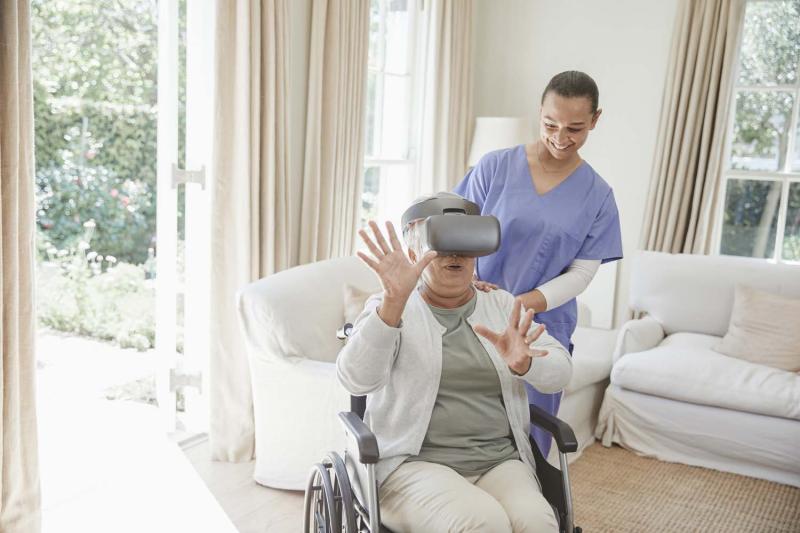Key points
- Technology has the capacity to both limit and enhance autonomy for older adults. For example, older adults under 24-hour surveillance monitoring may feel restricted. Others may appreciate the freedom continued monitoring brings as they can safely and independently move outside of home.
- The integration of technology into aged care may bring significant risk to the autonomy of individuals receiving care. Family members fear older adults could be pressured into using or adapting to technology despite their preferences and concerns.
- Service providers need to ensure that the cost-effectiveness and human benefit of adopting technology in aged care greatly outweigh the risk of harm involved.
Ethics refers to a system of moral principles that govern a person’s behaviour when carrying out an activity. In aged care, these principles are applied to every component of care and are often referred to as the ‘moral compass.’ [1] Ethical considerations are important to ensure the safety of aged care staff, care recipients, and the confidentiality of their personal information. Ethical guidelines work to protect human rights, particularly for vulnerable individuals. They promote the principles of autonomy (the ability of an individual to make choices concerning their care), beneficence (the obligation of care providers to attend to the wellbeing of individuals), and justice (for all individuals to be treated the same). [2]
The uptake of technology for older adults continues to increase, with many technology solutions and applications specifically designed for older people to use. For example, applications that target brain training to improve memory and communication with others have become increasingly popular. Aged care services have integrated a variety of technologies such as robots, virtual reality headsets, and monitoring sensors. As the uptake of technology increases so do the concerns around privacy, safety, autonomy, dignity, and informed consent. [3] Therefore, ethical considerations for the use of technology in aged care is an important topic for older people, their families, and carers. [4]
Older adults receiving aged care often have lower levels of health and increased dependence on services to support them. Older adults often present with reduced physical and/or cognitive function which can affect their ability to make informed decisions. [5] This suggests that older people receiving aged care services at home or in long term care facilities may be less able to make autonomous decisions about their care. Providing ethical care requires providers and aged care workers to know and understand the older adults they care for, be aware of their individual needs, and be able to assist them to solve problems. [5] Understanding the reasons for the use of technology and ensuring that the intentions of technology use follow ethical guidelines are important for maintaining human rights and quality of life for aged care recipients. [6]
This evidence theme summarises one of the key issues we identified as part of a scoping review of research on human factors and technology in aged care. We identified nine studies on this topic [3, 7-14]. These examined the ethical use of robots in aged care, [10, 12, 14], home monitoring technology, [11] the use of autonomous (artificial intelligence) systems in long-term care, [7, 15] the introduction of artificial companions and socially assistive robots to older adults with and without cognitive impairment, [4, 13] and general ethical concerns for the use of technology in aged care delivery. [3] If you require more information on this topic, try using our one-click PubMed searches provided below.
Ethical issues
From the literature, several ethical concerns specific to the use of technology in aged care were identified. These articles suggest that:
- A tension exists between the opportunities for technology to improve aged care and the ethical issues which stem from a lack of regulations. [13]
- Finding the right balance of in-home monitoring technology was important to support aged workers and not overstep any ethical or privacy boundaries for older adults. [11]
Autonomy
Autonomy refers to the rights of an older person to make decisions (e.g., about their own care) without being influenced by others. [16] The ability of older adults to maintain their autonomy is linked to their cognitive ability to make decisions. [16] This may leave older people living with dementia vulnerable to unethical care. Key findings from the scoping review suggest:
- Technology could both restrict and enhance autonomy for older adults, as some individuals felt restricted by video surveillance, whilst others saw the value of technology to enable them to mobilise safely outside of their homes. [3]
- Older people thought it was important to be able to decide whether technology was used as part of their care and valued the opportunity and ability to refuse technology. [3]
- The risk of older adults being pressured to accept technology (even if a need was identified) was considered a significant risk to the autonomy of older adults and an ethical care approach. [3]
- The use of robotics in aged care is more challenging than the use of other technologies due to ethical concerns that robots will infringe on an individual’s right to speak and make decisions for themselves. [14]
Do no harm (non-maleficence)
Health care providers are under obligation to ‘do no harm’ to those in their care (a principle termed ‘non-maleficence’). When considering whether to use technology in aged care, ensuring that no harm comes to older adults who may be physically and cognitively vulnerable is important as the benefits of technology should greatly outweigh any possible harm. [7, 17] Aged care services should consider the following areas of ethical concern:
- Safety (robotic device causing someone to trip or fall)
- Privacy and security (breaches of personal information)
- Accessibility and inclusion (technology should be accessible and inclusive to all aged care recipients regardless of their physical or cognitive abilities)
- Trust and accountability (use of technology should be transparent and communicated with aged care recipients and family members)
This evidence theme has been informed by the results of a scoping review intended to map the published research in this area. Our findings reflect the current state of the evidence which is limited in breadth and quality.
Specific concerns for cybersecurity, privacy and safety, and dignity surrounding the use of technology in aged care were reported frequently in the included articles. We present these findings as separate evidence themes.
- Cook C, Schouten V, Henrickson M, McDonald S. Ethics, intimacy and sexuality in aged care. J Adv Nurs. 2017;73(12):3017-3027.
- Varkey B. Principles of clinical ethics and their application to practice. Med Princ Pract. 2021;30(1):17-28.
- Sundgren S, Stolt M, Suhonen R. Ethical issues related to the use of gerontechnology in older people care: A scoping review. Nurs Ethics. 2020;27(1):88-103.
- Vandemeulebroucke T, Dierckx de Casterlé B, Gastmans C. The use of care robots in aged care: A systematic review of argument-based ethics literature. Arch Gerontol Geriatr. 2018;74:15-25.
- Hosseinabadi R, Momtaz YA, Shahboulaghi FM, Abbaszadeh A, Pournia Y, Kamrani AA. Aged care ethical values: A content analysis of the literature. J Clin Diagn Res. 2019;13(12):LE01-LE06.
- Lothian K, Philp I. Care of older people: Maintaining the dignity and autonomy of older people in the healthcare setting. BMJ. 2001;322(7287):668-670.
- Tan SY, Taeihagh A, Tripathi A. Tensions and antagonistic interactions of risks and ethics of using robotics and autonomous systems in long-term care. Technol Forecast Soc Change. 2021;167.
- Vandemeulebroucke T, de Casterle BD, Gastmans C. How do older adults experience and perceive socially assistive robots in aged care: A systematic review of qualitative evidence. Aging Ment Health. 2018;22(2):149-167.
- Berridge C, Halpern J, Levy K. Cameras on beds: The ethics of surveillance in nursing home rooms. AJOB Empir Bioeth. 2019;10(1):55-62.
- Hung L, Mann J, Perry J, Berndt A, Wong J. Technological risks and ethical implications of using robots in long-term care. J Rehabil Assist Technol Eng. 2022;9.
- Leikas J, Kulju M. Ethical consideration of home monitoring technology: A qualitative focus group study. Gerontechnology. 2018;17(1):38-47.
- Niemelä M, van Aerschot L, Tammela A, Aaltonen I, Lammi H. Towards ethical guidelines of using telepresence robots in residential care. Int J Soc Robot. 2021;13(3):431-439.
- Portacolone E, Halpern J, Luxenberg J, Harrison KL, Covinsky KE. Ethical issues raised by the introduction of artificial companions to older adults with cognitive impairment: A call for interdisciplinary collaborations. J Alzheimers Dis. 2020;76(2):445-455.
- Johansson-Pajala RM, Gustafsson C. Significant challenges when introducing care robots in Swedish elder care. Disabil Rehabil Assist Technol. 2022;17(2):166-176.
- Bourbonnais A, Rousseau J, Lalonde M-H, Meunier J, Lapierre N, Gagnon M-P. Conditions and ethical challenges that could influence the implementation of technologies in nursing homes: A qualitative study. Int J Older People Nurs. 2019;14(4):e12266.
- Moilanen T, Kangasniemi M, Papinaho O, Mynttinen M, Siipi H, Suominen S, et al. Older people’s perceived autonomy in residential care: An integrative review. Nurs Ethics. 2021;28(3):414-434.
- Street J, Barrie H, Eliott J, Carolan L, McCorry F, Cebulla A, et al. Older adults’ perspectives of smart technologies to support aging at home: Insights from five world café forums. Int J Environ Res Public Health. 2022;19(13):7817.
Connect to PubMed evidence
This PubMed topic search is focused on research conducted in aged care settings (i.e., home care and residential aged care). You can choose to view all citations or free full-text articles.

